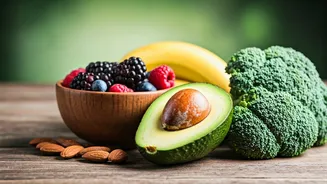Fiber's Gut Benefits
Fiber, often hailed as the cornerstone of digestive health, is vital for a smoothly functioning gut. Unlike other nutrients, fiber isn't broken down by
the body; instead, it travels through the digestive tract relatively intact. This unique characteristic allows it to perform several key functions, such as adding bulk to the stool, preventing constipation, and promoting regular bowel movements. By increasing stool volume, fiber helps the digestive process, making it easier for waste to pass through the intestines. Moreover, fiber acts as a prebiotic, nourishing the beneficial bacteria in the gut. These bacteria are critical for maintaining gut health, aiding in nutrient absorption, and supporting the immune system. A diet rich in fiber has been associated with a lower risk of chronic diseases, including heart disease and diabetes, making it a crucial component of a balanced diet.
Apples' Digestive Power
Apples, a readily available and widely enjoyed fruit, are an excellent source of soluble fiber, particularly pectin. Pectin has remarkable properties: it dissolves in water to form a gel-like substance. This gel-like consistency helps to slow down the digestion process, enabling better nutrient absorption and preventing blood sugar spikes. Soluble fiber can also bind to cholesterol in the digestive tract, aiding in its removal and lowering the risk of heart disease. Furthermore, apples are rich in antioxidants, which combat harmful free radicals and protect cells from damage. The fiber content in apples promotes a feeling of fullness, which can assist in weight management by reducing overeating. The benefits extend beyond the digestive system, with studies suggesting that regular apple consumption can improve overall health and reduce the risk of chronic conditions. Eating apples can be a simple, delicious way to boost your daily fiber intake and improve your gut health.
The Wonders of Bananas
Bananas are another accessible and nutrient-dense food that contributes significantly to gut health. They contain both soluble and insoluble fiber, offering a dual benefit to digestion. Insoluble fiber adds bulk to the stool, which helps in preventing constipation. Bananas are also a good source of prebiotics, which feed the beneficial bacteria in the gut. These bacteria ferment the prebiotics, producing short-chain fatty acids (SCFAs) that nourish the colon cells and support gut health. The high potassium content in bananas contributes to maintaining healthy blood pressure and supports muscle function. Bananas are easy to incorporate into any diet, whether eaten alone, added to smoothies, or included in breakfast cereals. Additionally, they are known for their ability to provide sustained energy, making them an excellent choice for a snack or a pre-workout meal. Their versatility and nutritional profile make bananas a top choice for anyone looking to improve their digestive health.
Berries: Tiny, Mighty
Berries, including strawberries, blueberries, raspberries, and blackberries, are packed with fiber and antioxidants, making them exceptional for gut health. They contain a mix of soluble and insoluble fiber, which promotes healthy digestion and regular bowel movements. The high antioxidant content in berries protects the gut from oxidative stress and inflammation. These antioxidants help neutralize free radicals, which can damage cells and contribute to various diseases. Berries also contain natural sugars and are relatively low in calories, making them a healthy alternative to processed sweets. They contribute to a feeling of fullness, aiding in weight management. Regular consumption of berries has been linked to improved cognitive function and a reduced risk of chronic diseases, including heart disease and certain cancers. The vibrant colors of berries indicate their high levels of antioxidants, highlighting the powerful health benefits they offer. They are also easily incorporated into the diet, whether enjoyed fresh, frozen, or added to various dishes.
Legumes' Fiber Punch
Legumes, such as beans, lentils, and peas, are among the most fiber-rich foods available. They provide both soluble and insoluble fiber, along with significant amounts of protein and other essential nutrients. The soluble fiber in legumes helps to regulate blood sugar levels and lower cholesterol, while the insoluble fiber promotes regular bowel movements. Legumes also contain prebiotics that nourish beneficial gut bacteria, contributing to a balanced gut microbiome. They are an excellent source of plant-based protein, which is beneficial for overall health, particularly for those following a vegetarian or vegan diet. The consumption of legumes has been linked to a reduced risk of heart disease, diabetes, and certain cancers. Legumes are also versatile in the kitchen, easily incorporated into soups, stews, salads, and side dishes. Their nutritional value makes them a great addition to any diet, supporting both digestive health and overall well-being.














